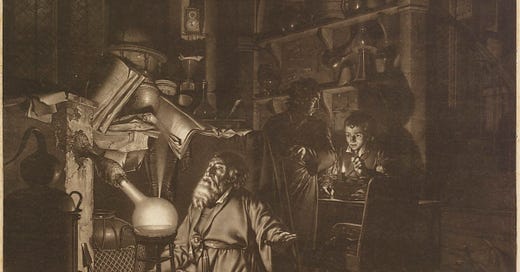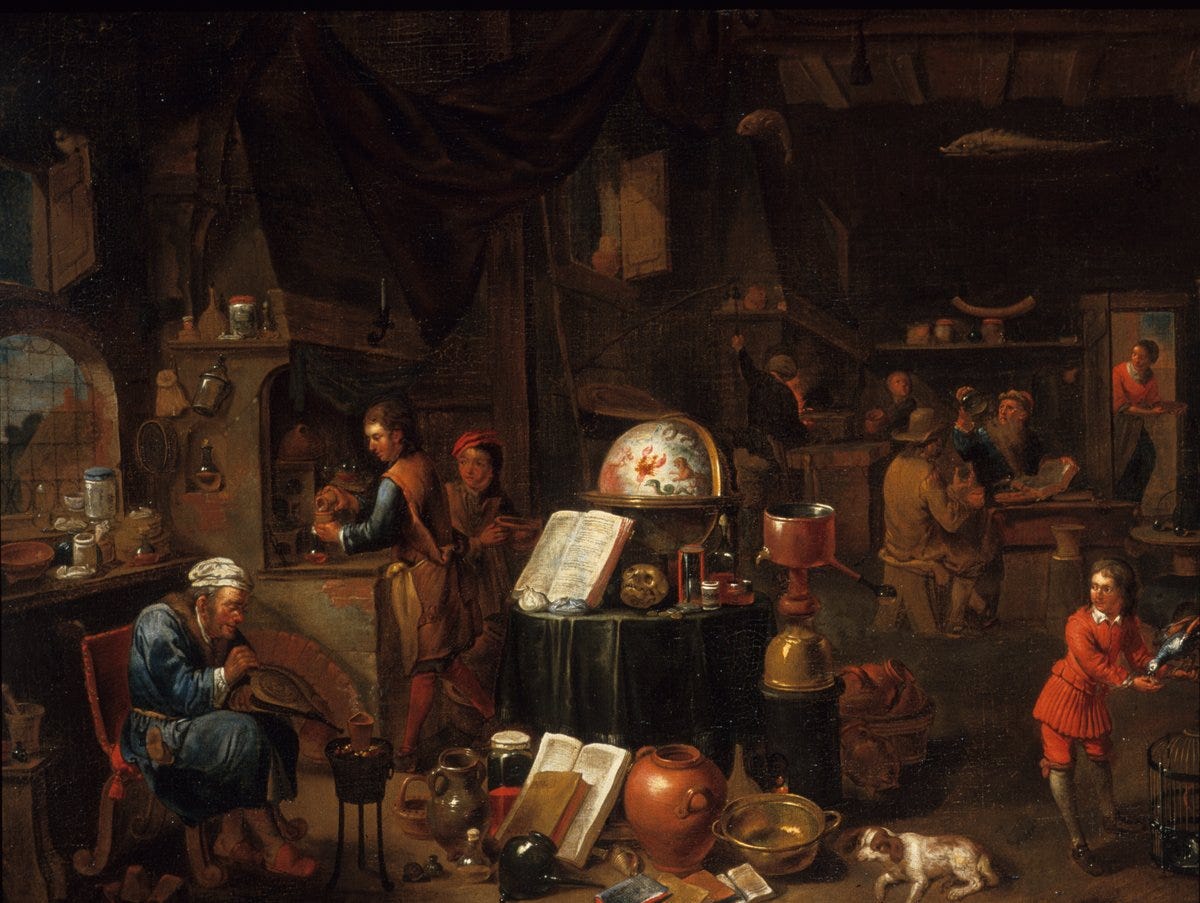As I’ve mentioned, I realized last year I had no rationale for the study of science at the level of general education. Sure, some of what gets covered in high school science is just neat and interesting.1 I also can understand why future scientists might want to get a jump on mastering the fundamentals of their disciplines, and I know that in practice, high school science courses serve as a sifting mechanism to find future scientists and also to identify a certain type of potentially economically useful nerd.2 But what good does learning about science do for the rest of us? Is there some educative purpose that studying science serves for everyone? Or could there be, if we did it differently?
The standard argument I have seen - and relied on to make my homeschooling plans until last year - is that general education should include knowledge of the scientific method and basic scientific facts and the correction of common scientific misconceptions in order to produce “scientifically literate” citizens. E.D. Hirsch has had me convinced for years about the importance of cultural literacy, and surely some knowledge of science is required to be culturally literate.
But it turns out, there’s a difference between the core of Hirsch’s argument - that some shared body of knowledge among citizens in a democracy is necessary for successful civic communication and deliberation - and the standard argument for “scientific literacy.”3 Here’s a pretty typical elaboration of the idea:
All of us have a stake, as individuals and as a society, in scientific literacy. An understanding of science makes it possible for everyone to share in the richness and excitement of comprehending the natural world. Scientific literacy enables people to use scientific principles and processes in making personal decisions and to participate in discussions of scientific issues that affect society. A sound grounding in science strengthens many of the skills that people use every day, like solving problems creatively, thinking critically, working cooperatively in teams, using technology effectively, and valuing life-long learning. And the economic productivity of our society is tightly linked to the scientific and technological skills of our work force.
Last year, for 9th grade science, I attempted to use a textbook specifically designed to impart scientific literacy through an integrated approach to the major scientific disciplines. It was co-authored by the physicist responsible for the scientific portions of Hirsch’s Dictionary of Cultural Literacy, and if anything would be the best possible representation of the scientific literacy approach, I thought surely this would be it.
The textbook bored Benedict enormously. I found it to be barely “integrated” and much more like much briefer versions of my high school survey classes strung together in an order that may make sense as a catalog of scientific knowledge, but I found in practice to not be pedagogically optimal. We were disappointed, and I returned to the idea of “scientific literacy” with a bit more skepticism.
It occurred to me - when was the last time any average citizen has been acknowledged by gatekeepers of the Science to have adequate scientific literacy “to participate in discussions of scientific issues that affect society” anyway? Even though the last four years certainly offered a great many opportunities, I cannot remember a single time. But the more I thought about this, the more reasonable it seemed. Answering actual scientific questions4 requires a great deal of scientific expertise developed through many years of dedicated study. I can’t even remember what the Krebs cycle is.5
And it's not enough to master the current state of scientific knowledge; scientific expertise, requires staying atop of and evaluating current research. The content of the sciences is subject to more frequent changes than any other discipline in the high school curriculum. I once encountered a Montessori guide who was deeply, deeply upset that some Montessori schools were still presenting their elementary students the five kingdoms and had not updated to the tree of life.6 She saw it as an appalling example of Montessorians’ unwillingness to depart from the dogmatic presentation of their founder’s materials and, even worse, teleological worldview and a gross failure of their duty to their students. However the tree of life may be on its way out, and the reticulate phylogenic network on its way in.7 If “scientific literacy” is anything, surely it is not memorizing information that can be out of date by the time it trickles down into K-12 textbooks.
Ok, maybe scientific literacy is not about accumulating enough actual, up-to-date scientific knowledge to weigh in on scientific questions, but maybe the important takeaway from high school science is learning what science is and how it works, learning how to “think like a scientist.” Here I think we get closer to the actual formative effect of high school science.
Every year, it seems, students review the idealized scientific method - hypothesis - experiment - observation - results - around and around again, ritually initiating students into a certain view of reality and knowledge. Something called “science” is exclusively associated with such broad aspects of reasoning as observing, inferring, and classifying. Responsible science educators will say they aren’t doing this - and I tend to believe that they really don’t think they mean to. They will do things like at the beginning of the textbook I used and discarded last year - talk about “different ways of knowing” and assure you that you can still have your art or your religion because that’s a different way of knowing about a different thing than science. But “science” claims all knowledge certified as universally accessible and thus admissible as evidence in the public square. I think this - if anything - is what students generally take from their high school science studies: a vague sense that scientific knowledge is one to which we all must defer, that we must all listen to the Science.
As a result - one apparently unanticipated by the advocates of scientific literacy - this actually exacerbates rather than helps resolve public controversies touching on scientific questions, as historian Steven Shapin has noted:
The problem we confront is better described not as too little science in public culture but as too much. Given the absurdities and errors abroad in the land, it may seem crazy to say this, yet the point can be pressed. …like the Moon-landing deniers and the Flat-Earthers, their rejection of Right Thinking is not delivered as anti-science. Instead, it comes garnished with the supposed facts, theories, approved methods, and postures of objectivity and disinterestedness associated with genuine science. Wrong-headedness often advertises its embrace of officially cherished scientific values — skepticism, disinterestedness, universalism, the distinction between secure facts and provisional theories — and frequently does so more vigorously than the science rejected. …you can reflect on why it might be that students of the human sciences are deluged with lessons on The Scientific Method while chemists and geologists are typically content with mastering just the various methods of their specialties. The Truth-Deniers find scientific facts and theories shamefully ignored by the elites; they embrace conceptions of a coherent, stable, and effective Scientific Method that the elites are said to violate; they insist on the necessity of radical scientific skepticism, universal replication, and openness to alternative views that the elites contravene. On those criteria, who’s really anti-scientific? Who are the real Truth-Deniers?
The more I thought about it, the more I realized that my goal for all my students was not that they have adequate scientific literacy to weigh in on scientific questions, still less that they think they have adequate scientific literacy to weigh in on scientific questions, but that they have the epistemic literacy to answer the more fundamental question “Is the problem or controversy before me an actual scientific question or is it something else?” What I wanted was a humane study of science coherently integrated with our general education goals of developing my kids’ human faculties in pursuit of wisdom and eloquence.
There doesn’t seem to be a textbook for that.
To be continued…
Though this often seems to be obscured by how it's taught.
It sifted me right out, and I remember only a few - to me - meaningless phrases from my high school and collegiate science studies, like, uhhh, Krebs cycle.
Interestingly, in his original article, Hirsch noted that only “vague” scientific knowledge is a required part of cultural literacy: “How much do I really have to know about DNA in order to comprehend a newspaper text directed to the common reader? Not much.”
As opposed to political questions masquerading as such.
Though by Hirsch’s standard, I probably do remember enough to still count as culturally, if not scientifically, literate (it has something to do with metabolism, right?)
She, conveniently, created and sold tree of life materials.
I look forward to its lavishly illustrated picture book treatments.







